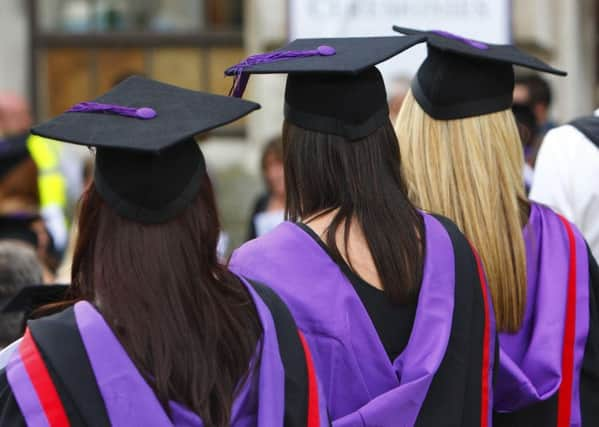Teenage boys less likely to aspire to university


Researchers also say that by the age of 15 or 16 aspiring to go on to university makes a big difference to the A-level choices students make, particularly for those from disadvantaged backgrounds.
The report published today by the Sutton Trust is based on data from more than 3,000 young people who have been tracked since they were three-years-old.
Advertisement
Hide AdAdvertisement
Hide AdIt explores how a young person’s aspirations and attitudes towards university affect their exam results after GCSE.
And it also identifies factors that are important in shaping pupils’ aspirations and belief in their abilities. These include attending a more academically effective primary school, a “well-resourced” secondary school and being encouraged to spend time on homework.
The Sutton Trust is calling for support to encourage reading for pleasure, trips and out-of-school studying opportunities that can boost attainment for disadvantaged students at all ages.
It also called for more opportunities for disadvantaged pupils to go to “the best schools – those rated outstanding by Ofsted.” And it says disadvantaged children should be given the opportunity to attend good pre-schools with staff qualified to degree level.
Advertisement
Hide AdAdvertisement
Hide AdThe report says 15 and 16-year-olds with similar GCSE results were twice as likely to go on to do three A-levels if they saw university as a likely goal for them.
Pupils from poorer homes were less likely to think they will go on to university than their more advantaged peers, with only 27 per cent having high aspirations compared with 39 per cent of their better off peers. The researchers found that by year nine, when pupils are 13 or 14, girls had more positive attitudes towards university than boys. Almost 65 per cent thought it very important to go to university, compared with 58 per cent of boys. Over half of all the year nine pupils surveyed (61 per cent) thought it was very important to get a degree compared with only 13 per cent who said it was of little or very little importance.
Around one in 10 girls felt it was not important to get a degree, but among boys the proportion declaring university to be of little importance was 15 per cent.
As well as attaching importance to a university degree, the researchers also found that students who believed it was a likely goal for them were more likely to carry on with academic study after GCSE.
Advertisement
Hide AdAdvertisement
Hide AdMore than 60 per cent of students who believed it was very likely that they would go to university took three or more A-levels and three quarters of those who felt they were not at all likely to go to university did not continue onto an academic route.
The research was carried out by Oxford University.
Sir Peter Lampl, chairman of the Sutton Trust said: “Today’s report shows us how important it is to raise the aspirations and self-belief of pupils from poorer homes, particularly boys. We need to offer more support to disadvantaged young people throughout their education so that they are in a position to fulfil their potential after GCSE. Crucially it shows that both aspirations and attainment matter for pupils, so it is vital that schools support both particularly for their poorer pupils.”